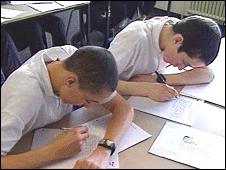Top schools will no longer face Ofsted inspections
- Published

Inspectors will no longer have to make routine visits to all schools
Outstanding schools in England will no longer face routine Ofsted inspections, the new education secretary has said.
Michael Gove said the move would allow education inspectors to focus their efforts on failing schools instead.
Under the plan, the 2,000 primary, 600 secondary and 300 special schools rated as outstanding by Ofsted would only be inspected if there were warning signs such as bad exam performance.
Currently they are inspected every five years.
The news comes just days after Mr Gove announced plans to allow all outstanding schools to automatically become academies, outside of local authority control.
'Freed from inspection'
In an interview with the Times Educational Supplement (TES), Mr Gove said: "Outstanding schools will be freed from inspection, [but] if there are certain indicators that flash 'danger' then it will be triggered and there is always the parental request for an inspection if there are problems as well."
Measures to reform Ofsted and change inspection rules for top-performing schools will form part of the Education and Children's Bill, which is due to be published in the autumn.
Mr Gove did not give details of how schools which are not routinely inspected will be monitored.
But plans for a "traffic light" monitoring system that would show if a school is deteriorating were suggested by the Conservatives last October.
'Greatest impact'
Mr Gove said that freeing up Ofsted in this way would give more time for "no notice" inspections, and allow inspectors to spend more time in failing schools.
"Of course things can change, heads and leadership teams can change, there can be changes of intake, changes of staff, changes of funding.
"But there are a number of ways in which lights can flash and we can see what's happening," he told the TES.
An Ofsted spokeswoman said: "Ofsted already focuses inspection on where it will have the greatest impact for children and learners. We will work with the government on what this means in practice."
Chris Keates, general secretary of the NASUWT, said: "This announcement is nothing to do with 'freeing' schools.
"It is an unsubtle attempt to encourage more schools to sign up for academy status."
- Published26 May 2010
- Published25 May 2010